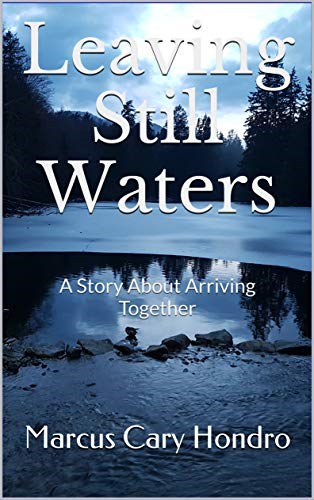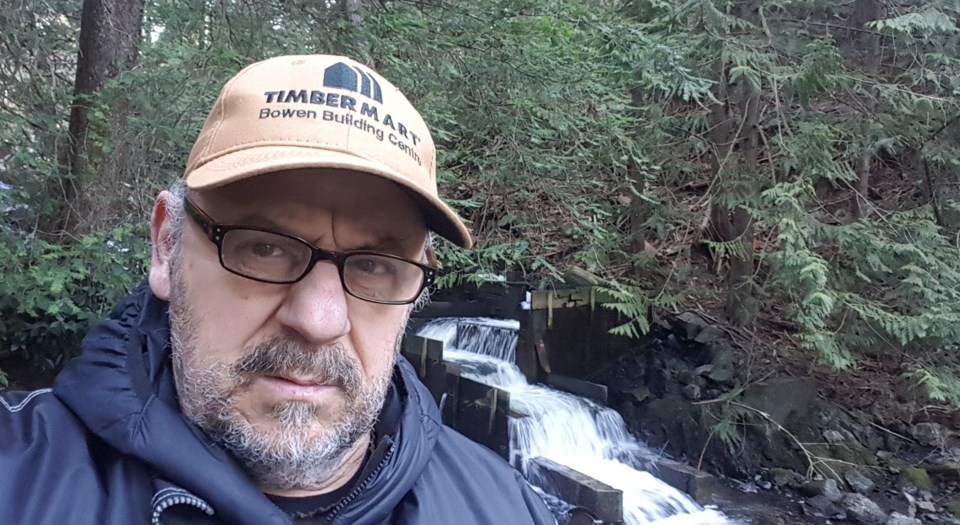Back in October, island actor, author and Undercurrent staple Marcus Hondro published his first novel, Leaving Still Waters, self-publishing on Amazon Kindle.
Though the book is set in a fictional town islanders will find a familiar vibe throughout the novel in style, names and a certain local newspaper.
And what’s Leaving Still Waters about?
It’s about a young woman who tries to rescue a young man’s family and is met with a good deal of reluctance, mostly because the young man is hesitant to act and because she is, well, rather bossy. Ultimately it’s about family.
You’re a long-time columnist, reporter, interim editor for the Undercurrent, and there’s a very important similarity with the novel there.
The column and novel do have a similarity, I should think, in that they’re both somewhat irreverent with a whole lot of characters and tend to be a little immature. Certainly in The Slow Lane Chronicles, there was a good deal of immaturity in that. They’re both about warmth and community.
Also, in the novel the family runs the local newspaper.
The first time I encountered this was in a book by Dorthea Brande, the notion that you’re not making things up when you’re writing fiction, you’re letting things out. Letting that happen lead me in various directions. I mean I didn’t put much thought into it when I was coming up with what the family did in this small town called Still Waters. It seemed natural that they ran the local newspaper.
And it’s a family business.
It’s a family business. So yeah, that mirrors in a sense with Tracey [Marcus’s wife] and I having both worked at the Undercurrent and her continuing to do so. And for a while we worked on it together. Which went well and no, she wasn’t bossy like Casey is in the novel. Or not very.
So you have some pretty wacky stories in the novel. How many of those are true stories you’ve written? Like there’s a giant pumpkin…
Yes, it’s a big pumpkin. There’s certain stories you’re going to write when working at a newspaper. But I also got elements of the novel from having been a performer at Vancouver Theatresports for years in that recapitulation, that kind of thing, is really important in improv and I used it in the novel a lot. That learning about recapitulation lead me to having themes and helped provide arcs for some of the characters. For example, Riley has a running theme of being annoyed by clichés. The pumpkin grew from that and so did later references to it and all of that helped me find that particular character.

And Bowen Islanders will recognize some details.
I may have taken names and stories, even an event or two that took place on Bowen. I know when I read Edye Hanen’s Nine Birds Singing there was a lot of Bowen, some of her novel specifically takes place here, also in Nick Faragher’s novel, there were Bowen references. So if I needed a street name, throw in Windjammer, why not? I mean it’s a pretty cool name.
And there’s a lot of mystery involved.
There’s an element of mystery and I hope an element of romance and humour. And it’s really a, I don’t know if you’d use the word, potpourri. There’s a lot of different moving parts so I think it’s hard for me to categorize it. I keep coming back to it being, in the end, about family. I love family and I think that’s part of why I love Bowen, it’s like having an extra family. Getting on the ferry can be like gathering with cousins and their amusing kids. And that mood, whatever, is a part of Leaving Still Waters. Family is something we strive to attain and stay a part of and that’s what my characters are doing.
How long were you working on this book?
I really started back when I lived in Toronto ––I went out to Toronto for six years and I was having plays produced. I’d written a screenplay that had a lot of the elements of Leaving Still Waters and then I didn’t do anything with the screenplay. I’ve had short films made of my material but that screenplay went nowhere. And then I thought it might help to use elements of it for my first novel.
So I had something to work with and some characters I liked to work with. It really did make writing this easier. I won the Vancouver Courier short story writing contest twice so had an idea about writing prose but a novel was an entirely different beast. I mean it’s 70,000 words and it takes a lot to stick-to-it-ness but I managed it. I also had great notes from my readers, Mary Ann Zakreski and Ann Ramsay. As for time, let’s just say it took months. And months.
What was the writing process like?
The process of writing is, for anybody that’s interested in doing it, as I know we have a lot of writers on Bowen, it’s really enjoyable if you have that allotted time every day. It’s kind of easy once you get into a rhythm, away you go. I can write news stories with a few spare minutes here and there but with a novel, no, you need blocks of time on a regular basis. Or I do. And here’s this: I became a real believer in not knowing where you’re going, just sit down every day and head somewhere. Eventually you get there. Kinda like in life.



